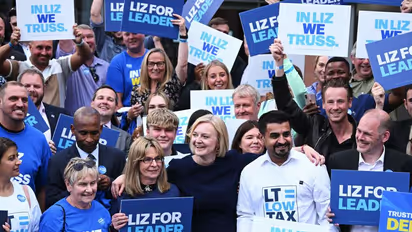5 key challenges Liz Truss faces as UK's new Prime Minister

Synopsis
Liz Truss has been declared the winner of the Conservative Party election and will succeed Boris Johnson as the UK's Prime Minister. She is all set to succeed Boris Johnson as the new UK PM on Tuesday, but it's not going to be an easy task amid cost of living crisis in the country.
The Conservative Party election has been proclaimed Liz Truss the winner, and she will take over for Boris Johnson as prime minister of the United Kingdom. Truss received 81,326 votes, more than 20,000 more than her opponent Rishi Sunak, who received 60,399 votes. Tuesday will see Liz Truss take over as the new prime minister of the United Kingdom, but given the country's cost of living issue, it won't be an easy feat. As UK PM, she must address the following major issues:
Various employees on strike
Thousands of workers in the legal profession, the postal service, railroads, ports, and garbage collection are striking in protest of the rising cost of living. Inflation in the United Kingdom has exceeded 10% for the first time in forty years. According to the Bank of England, inflation will hit 13% in October.
Impact of Brexit
Since the UK decided to exit the European Union, finding workers to fill unfilled positions has proven to be challenge for British government. Trade is also being impacted by Brexit, particularly with the European Union, which is the UK's top trading partner. Exports and imports will be around 15% lower than they would have been had the United Kingdom stayed in the EU, according to the Office for Budget Responsibility.
Also Read | Liz Truss elected as UK's 3rd woman PM, defeats Rishi Sunak by over 20,000 votes
Food and energy costs rising
Inflation in Britain is currently in the double digits. For the first time in 40 years, inflation increased beyond 10% as a result of rising food and energy costs. According to CNN, the cost of food and energy is continuing to grow by thousands of pounds. From October, the average UK household's energy costs will be 3,549 pounds (Rs 3,25,731.62). The UK's Chancellor of the Exchequer, Nadhim Zawahi, earlier in August declared that "keeping inflation under control" remained his top goal.
UK to experience recession
According to the Bank of England, the increase in natural gas prices would push October's inflation rate to 13.3%. It also stated that the UK will experience a recession later this year as a result of inflation. According to the Bank of England, family expenditure on gas and electricity bills would rise by 3.5% between 2021 and 2023. It was noted that the spike is five times more than that which UK families experienced during the 1970s energy crisis.
Also Read | Who is Liz Truss, the new Prime Minister of Britain
Energy crisis deepens
According to Britain's energy authority, annual home energy costs would increase by 80% for Britons. An average UK resident's annual energy prices will rise from 1,971 pounds (1,80,915.33) to 3,549 pounds (Rs 3,25,731.62). Notably, the gas provider price ceiling will go into force on October 1. Here, it is important to note that the price cap is the most that gas suppliers may charge customers for a unit of energy. In January, it is anticipated that energy costs would rise once more to 4,000 pounds.
Also Read | Liz Truss becomes UK PM; Know her net worth, car collection & more
Check the Breaking News Today and Latest News from across India and around the world. Stay updated with the latest World News and global developments from politics to economy and current affairs. Get in-depth coverage of China News, Europe News, Pakistan News, and South Asia News, along with top headlines from the UK and US. Follow expert analysis, international trends, and breaking updates from around the globe. Download the Asianet News Official App from the Android Play Store and iPhone App Store for accurate and timely news updates anytime, anywhere.